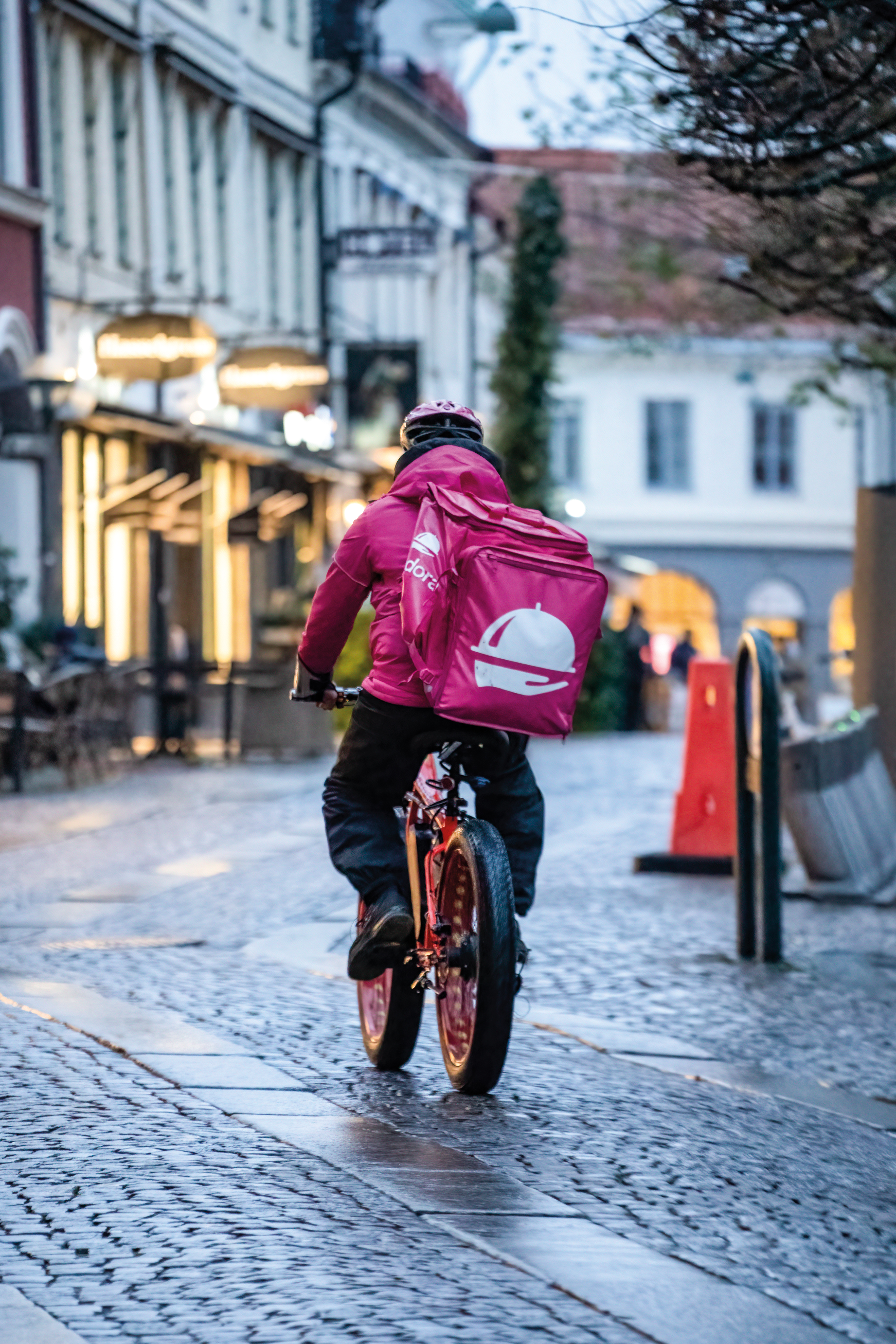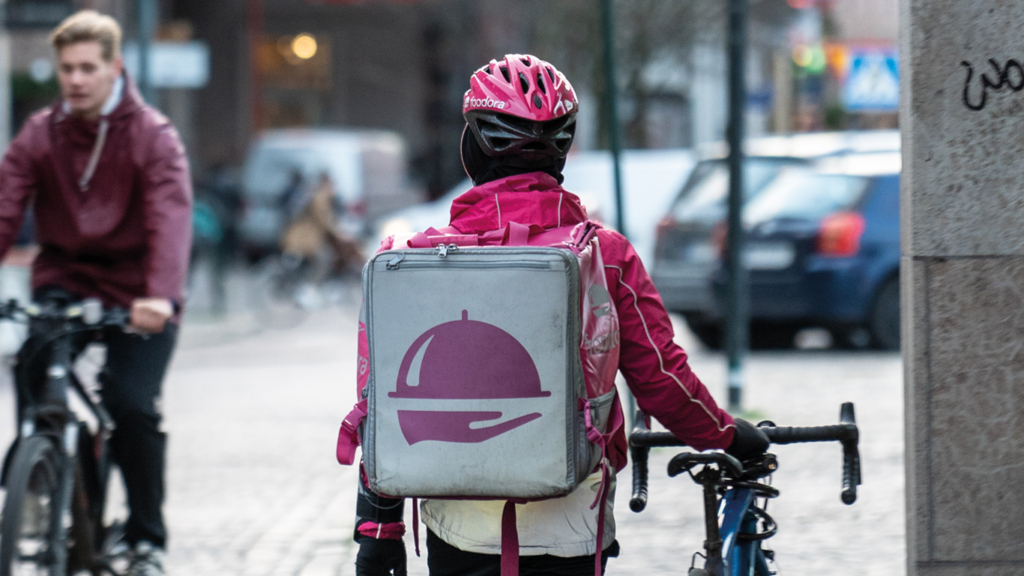Within the gig economy, students are often depicted as the ideal worker. But what is it like to combine work in the gig economy with studies?
This is the English version of the article ”En eker i hjulet” (23/12). Translation was made by Tora Hammer.
The Christmas tree on Stortorget lights up the delivery driver. Wearing black pants, a pink jacket, and a big, heavy bag with the text “Foodora” on it, he pedals his way through the darkness and cold. He disappears, out of sight, on his way to one of Lund’s restaurants or another anonymous customer.
Foodora’s application site is clearly addressed to young people: slogans like “discover your city”, “flexible hours” and “no previous experience needed” all appeal to the student who is new in town and might be in need of an extra job. Or to someone having trouble entering the Swedish job-market.
Adam is an exchange student from a West African country and works at Foodora. Prior to coming to Sweden, he worked as an assistant program coordinator on a voluntary UN organization, as a personnel director and administrative assistant at a commercial enterprise, as well as a research intern at another UN organ. A highly coveted scholarship paved his way to Sweden.
At his home university, he was told that Sweden was full of job opportunities for students. With his qualifications, he had high expectations on entering the Swedish job market. But in reality, it turned out to be more difficult than anticipated.
– Regardless of the opportunities I had back home, they are limited here. I mean, getting into corporate as a foreigner is difficult, if not impossible.
When Adam first came to Lund, friends told him about Foodora. After a conversation about job opportunities, the company seemed to be the most convenient option at hand. As soon as he got his social security number, Adam applied to become a delivery rider.
I called Adam in November of 2020, two years into his employment at Foodora. During his time as a ‘rider’ – as it’s called – the company has incorporated the competitors Onlinepizza and Hungrig.se. Adam has noticed that most colleagues are international students, just like him.
In Sweden, Foodora hires its riders, which is unusual for companies in the gig economy and. The company bucks against the trend where full-time employments are replaced by more insecure ones. Despite that, Foodora is categorized as a gig company by the organization Gigwatch, due to its insecure terms of employment.
Every delivery rider is hired on one to three months’ contracts. To keep the job, the riders need to get good ratings in the app “Roadrunner”. The ratings, in turn, are decided by an algorithm measuring the time it takes to deliver an order. Adam says that time pressure is a constant stress element:
– You always have to deliver the best you can. Every month, you’ll hear: ’your job is on the line, your job is on the line, your job is on the line.’
The delivery riders work in groups with a captain, who answer to a regional manager and dispatch (those who manage the delivery personnel).
The pressure put on riders by management varies from day to day. There are more orders on a Sunday than on a Tuesday. Sometimes they allow a break, sometimes they don’t:
– They always try to spur you by saying: “You can do this”. But when the pressure is too high, they’ll force you, says Adam.
– I had a colleague, a captain, who used to complain about the management. They stripped him of his captain status. Then, all of us got scared of going to the management team with problems, and of not getting our contracts renewed.
He also reports that the rating procedure isn’t logical. Sometimes, restaurants receive their order after the riders, leading to time spent waiting at the restaurant. Also, riders frequently arrive at customers who are impossible to contact, says Adam.
The time spent waiting at the restaurant and customer is included in the rating – which, according to Adam, is illogical since the rider neither can nor is allowed to do anything about it:
– We are not allowed to be confrontative, we are not allowed to talk at the restaurant. I don’t know how we are supposed to solve it all. We don’t have a lot of power. We don’t have a choice, he says.
…
The first time the gig economy was drawn to national attention was in the Swedish Government Official Report 2017:24 “Ett arbetsliv i förändring- hur påverkas ansvaret för arbetsmiljön?” (A changing working life – how is responsibility for the working environment affected?). It describes the platform facilitated work that is common among companies in the gig economy as a three-party-relationship between the service provider, the service facilitator and the consumer – i.e., the worker, company and customer.
The customer wants a service being provided. The company- often via an app – hands the service to the worker for a fee taken from the customer’s payment.
The report detected a future need to classify the different parties: “What roles the parties are to play in the development of work organized by digital platforms, including about work environment issues, is a challenge for Sweden’s future labor market.”

Niklas Selberg, senior lecturer in law at Lund University, has researched work environment law within the gig economy. He has investigated gig workers’ ambiguous position on the Swedish labor market, and to what extent they can make use of work environment law.
The gig workers need to be classified as employees for the environment laws to apply. The company would be categorized as an employer and, therefore, employment laws are applicable. But, according to Niklas Selberg, the gig companies sometimes want to classify the workers as contractors, i.e., freelancers.
Because of this, Gig workers are put in a tricky negotiating position, but not an impossible one. Niklas Selberg mentions that those who work as, for example, Uber drivers have a natural place in the taxi drivers’ union.
– It’s up to the unions, they have to demand labor contracts. This is the only way this sector can be regulated, he says.
The newspaper Sydsvenskan’s many stories about Foodora have led to more attention given to the company’s negotiations with the transport workers’ union. But right now, the workers don’t dare to join the union. Partly because it costs money, which is scarce among riders, but also because of the fear to lose one’s job, reports Sydsvenskan (10/11).
Jacob Lundberg from Gigwatch, an organization monitoring the gig economy in Sweden, worries as he studies gig companies at an international level. In California, Uber and Lyft, among others, have joined forces to push through a government bill that will judicially classify gig workers as freelancers. The gig companies have poured almost 200 million dollars into the campaign. The outcome was successful, the bill was voted through. Uber’s CEO Dara Khosrowshahi implied in the New York Times (11/11-20) that the company will advocate similar bills in other countries where they operate.
Despite the Swedish gig companies not having the same economic resources as their American counterparts, the Swedish labor market is in the danger zone of being “gigified”, says Jacob Lundberg. The term was coined by Gigiwatch to describe the gig economy’s influence on the labor market. The organization doesn’t see the gig economy as being limited to companies like Foodora and Uber: transforming employees into freelancers saves money, which is of interest to companies regardless of their participation in the gig economy.
Meanwhile, says Jacob Lundberg, the gig company business model is not to be seen as profitable: the gig companies survive on investor funds. At the beginning of 2018, Uber had received 26 billion dollars – circa 200 billion SEK – in investor funds while still taking losses. The reason for investors still pouring vast sums into these companies is a long-term play, where Jacob Lundberg sees two potential outcomes:
– The gig companies either automate their operations, which at least now seems unlikely, or they manage to reduce the terms and wages on the labor market and out-compete traditional companies in the same industries. At that point, both gig companies and investors will start making big money.
At the same time, the gig economy contains opportunities for its participants. Caspian Rehbinder, program manager for labor market issues at the market-liberal think tank Timbro, views gig working as a temporary solution for job-seekers in Sweden, especially during the pandemic. He says that the Swedish labor market’s high entry thresholds – such as high starting-salaries – make hiring people less attractive to companies, leading to disadvantages for those with lesser knowledge of the Swedish language.
– The gig economy may not be the only or even the structurally best solution, but it can help lower the thresholds to the labor market, says Caspian Rehbinder.
…
Adam begins his shifts by cycling to a meeting point in central Lund. He has to be there thirty minutes before his shifts start. There, he logs into the app where the customers’ orders are being collected and directed to him.
Like all delivery riders at Foodora, Adam gets an order-id to show at the restaurant. Best-case scenario: the restaurants have also received the order and have the meal ready at his arrival. Otherwise, he has to wait. He doesn’t know where to deliver the order until he gets the food.
The possibility to decline an order was added quite recently, but before that, the system frequently collided with Adam’s studies.
– I had to ride from Domino’s up to Norra Fäladen, about 4 kilometers. I had to take the order shortly before 2 pm when my shift was over, but I had a seminar at 3 pm. I didn’t even have time to go home and change, he recalls.
The clock ticks constantly: the riders have to work fast and take one delivery after another to receive a good rating. Time spent at the restaurants, on the bike and at the customer is all accounted for. The gross salary is 70 SEK/hour with an extra 20 SEK per delivery, and the company reckons that the riders make three deliveries an hour.
The low wage is legal. Sweden hasn’t got any legal minimum wage. Instead, the unions negotiate on collective agreements for working conditions and minimum wages. According to Jacob Lundberg, the unions show relatively little interest in the gig workers’ situation in the labor market. Hence, their position has worsened.
– It’ll be difficult and expensive for single workers at gig companies to push through safer conditions, better wages and a sounder working environment without union involvement, he says.
Adam recounts an incident when he passed a pedestrian crossing while logged into the app and wearing the bright pink Foodora jacket. Like all employees, he was riding his private bike. On the crossing he got hit by a car, which drove off without stopping.
– The car damaged my bike and my shoulders so that I couldn’t work. I still panic when I get to a pedestrian crossing, the trauma is still there.
The car was long gone when the police arrived, the license plate out of reach. The police said that they couldn’t do anything and that Adam had to contact his employer to get help. Foodora’s employees are covered by accident insurance with If Skadeförsäkring, who defines an accident as “a physical bodily injury, unwillingly caused to you due to a sudden, external and unintentional accident”.
Adam filed an accident report to Foodora in which he described what happened, that his bike was broken and that his shoulder was injured. In the reply from Foodora, he found out that the insurance would not cover the accident. They considered the person driving the car to be responsible.
He got a few days off. No compensation for the bike nor the sick days.
…
Ethnology student Astrid Karabová Bäckströms interest in gig workers was set after hearing the radio program “The new day laborers” on P1. She chose to write her bachelor’s thesis on the subject. After going through the research field, she realized that previous studies didn’t cover the gig workers’ perspective and wanted to change that:
– The gig economy’s pros and cons, how it’s to be used, and how it can be stopped were discussed. But nobody mentioned the perspective of a “gigger”.
Astrid Karabová Bäckström started with interviews of gig workers, where she, among other things, investigated the ideal of the gig worker’s physique and background. The companies, she says, depict the workers as young, white students. This did not correspond with reality: When attending a group interview for a company, the name of which is not included in the essay, most of the participants were older men with a foreign background.
Communication between the riders takes place via a chat on Whatsapp, to which the manager also has access. Astrid Karabová Bäckström sees a clear problem in the lack of physical rooms to meet: If all communication goes through a supervised chat, the riders cannot get acquainted with each other or their manager. As a result, problems are raised less often, the feeling of an insecure working environment increases, and it gets harder to unionize:
– There are many traps that create insecurity: A bike gets damaged, a meeting with an intimidating customer. When that happens at work the gig workers have no one to turn to. Especially not if there are no distinct colleagues, says Astrid Karabová Bäckström.
Since the delivery riders cannot independently share experiences, unionizing – which is needed to improve the working conditions – is hampered. At Foodora in Norway, the riders got an opportunity to communicate without their managers through bicycle cafés. In thanks to those meetings, they could organize strikes and push through collective agreements. The victory was bittersweet:
– When they won the strike and got collective agreements, Foodora stopped hiring people altogether. All the new employees who started working at the company were instead seen as freelancers and hence were not covered by collective agreements, says Jacob Lundberg.
Adam gets his employment conditions by email from Foodora when they are updated. His input is not requested when the conditions are put together – an experience that is probably shared by many riders. The contrast between how much responsibility he has to mantle and how much he can influence bothers him.
During the pandemic, there have not been many work options, even though he sends several applications every week. He views the exercise and the opportunity to explore the city as perks of his job, which he wouldn’t get if stayed home. Meanwhile, he sees colleagues disappear while he remains:
– I’m always trying to do my best, and then I hope for the best. This is not the only option, but it’s the option I have right now.
Lundagård has been in touch with Foodora and asked for a comment on the time pressure, the lack of breaks and compensation, as well as the perceived risk one takes when uttering criticism. Foodora says that the customers’ demands for prompt delivery times are reflected in their demands on their delivery riders. The efficiency of the system is valued higher than the speed of the riders, and the riders have natural breaks between the orders. If that isn’t enough, the riders can ask dispatch for breaks. Furthermore, Foodora says that accidents are to be reported and that employees have a right to get sick pay and rehabilitation. They encourage feedback and say that multiple factors affect any decision to extend contracts of employment.
On January 28th, Sveriges Radio Ekot reported that Foodora is close to a collective agreement with the union Transport. The agreement, that needs to be accepted by the two parties, would come into force on March 1th.

Adam is a made-up name to keep him anonymous.
Quotes from Niklas Selberg, Jacob Lundberg, Caspian Rehbinder and Astrid Karabová Bäckström have been translated from Swedish to English.









